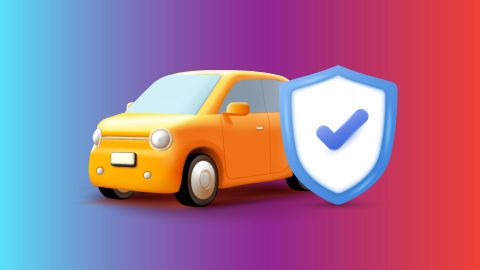Evaluate your car
Calculate the valuation of car
Key features and benefits
-
Extensive coverage at low premiums
Our insurance partners offer a host of car insurance policies that offer comprehensive coverage against own and third-party damage and the convenience of cashless repairing. Premiums start from as low as Rs. 3,031*.
-
Cashless car repairing at 6,500+ garages
Repair your car across 6,500+ partner network garages in India without having to pay in cash.
-
Personal accident cover
Get personal accident coverage of up to Rs. 15 lakh in case of accidental injuries, disabilities, or death. This coverage is applicable for the owner-driver of the vehicle.
-
Buy insurance without paperwork
No need to fill out physical forms or submit a list of documents to insure your car.
-
Avoid claim deductions due to depreciation
The zero-depreciation add-on covers the depreciation of car parts so that you can claim insurance without any deductions for depreciation.
-
No claim bonus up to 50% of premium
Save up to 50% on your insurance premium while renewing your car insurance policy.
-
Engine protection add-on cover
Covers the repair/replacement cost of the car's engine. In a city with heavy rainfall, this is an add-on you must carry.
-
Roadside assistance
This add-on coverage gets you 24x7 roadside assistance for a diverse range of car issues.
-
Key replacement coverage
This add-on benefit covers your expenses incurred for replacing a lost or misplaced car key and lockset.
Frequently asked questions
Owning a car insurance policy offers a variety of benefits. Firstly, it helps you meet the legal requirement of owning at least a third-party car insurance cover. Moreover, a car insurance policy helps you meet own or third-party damages due to a road accident or other unfortunate events.
IRDAI determines the premiums of third-party car insurance plans. Whereas the premium from insurance company to insurance company. Following are some factors that affect the premium for own-damage four-wheeler insurance cover:
1. Insured declared value (IDV)
2. Make and model of the car
3. Deductibles
4. Seating capacity
5. Cubic capacity
6. Previous insurance history
The type of coverage has an impact on the premiums. Do compare insurance premiums to obtain the best deal. The IRDA decides third-party premium amounts.
Depreciation in car insurance refers to the loss of the insured car’s value due to wear and tear. The depreciation rate plays a vital part in a car insurance policy. Insurance companies determine the value that they agree to provide for your car based on the car’s age and depreciation.
Comprehensive car insurance gives coverage to your third-party liabilities in addition to the damage sustained by your car. The damage could be due to an accident, theft, fire, natural calamities, and man-made disasters.
Zero Depreciation is an add-on cover in car insurance. It makes the insurer pay the complete claim amount without taking the depreciation of the parts of the car into consideration. Since it is an add-on, you will have to pay a little extra premium to avail of it.
Insured Declared Value (IDV) is the maximum sum insured set by the insurer for theft or total loss of the insured car. IDV is the present market value of the car. If your car suffers total loss, you will receive the IDV as compensation.
A cashless car insurance claim provides you with instant aid after an accident or any unfortunate event and helps you avoid paying any repair costs. However, this claim is only applicable when you repair your car at a partner network garage.
A policyholder receives a No Claim Bonus (NCB) if they have not filed any claims throughout the insurance period. The comprehensive insurance plan in India varies between 20-50%, according to current laws. A third-party motor insurance plan does not qualify for the NCB. At the time of the vehicle transfer, you can transfer the insurance plan to a new insurance provider, but not the NCB. The new buyer is responsible for paying the outstanding balance.
Yes, if the policyholder changes their motor insurance carrier at the time of renewal, they are eligible for the NCB. All you would have to do is show verification of the NCB you have earned from your existing insurance provider. You can show an authentic copy of your expired policy and certification showing you have not filed a claim against the (expiring) insurance plan.
The deductible is the amount that you need to pay out of your pocket while filing a claim. Generally, there is a standard or mandatory deductible for two-wheelers, cars, and commercial vehicles. It depends on the carrying capacity or cubic capacity of the vehicle. However, the insurance carrier may impose a larger deductible based on the vehicle's age or the frequency of filing claims.
As per the Indian Motor Tariff, every car owner in the country must own a third-party car insurance cover. Absence of a valid third-party car insurance plan is a punishable offence. It attracts a fine of Rs. 2,000 and/or imprisonment of up to 3 months for the first offence.
Car Insurance is an agreement between an insurance company and a car owner. As per the agreement, the insurer provides an insurance cover for financial damages incurred by the insured car. There are three types of car insurance plans – third-party car insurance policy, own-damage car insurance and comprehensive car insurance policy. Car insurance renewal online process provides instant e-policy.








